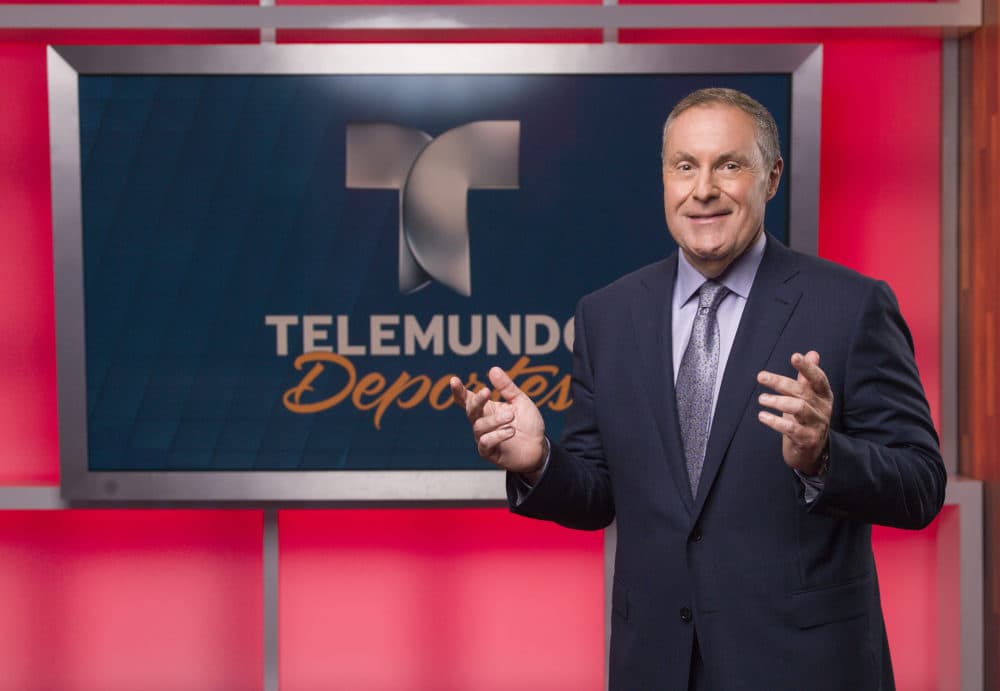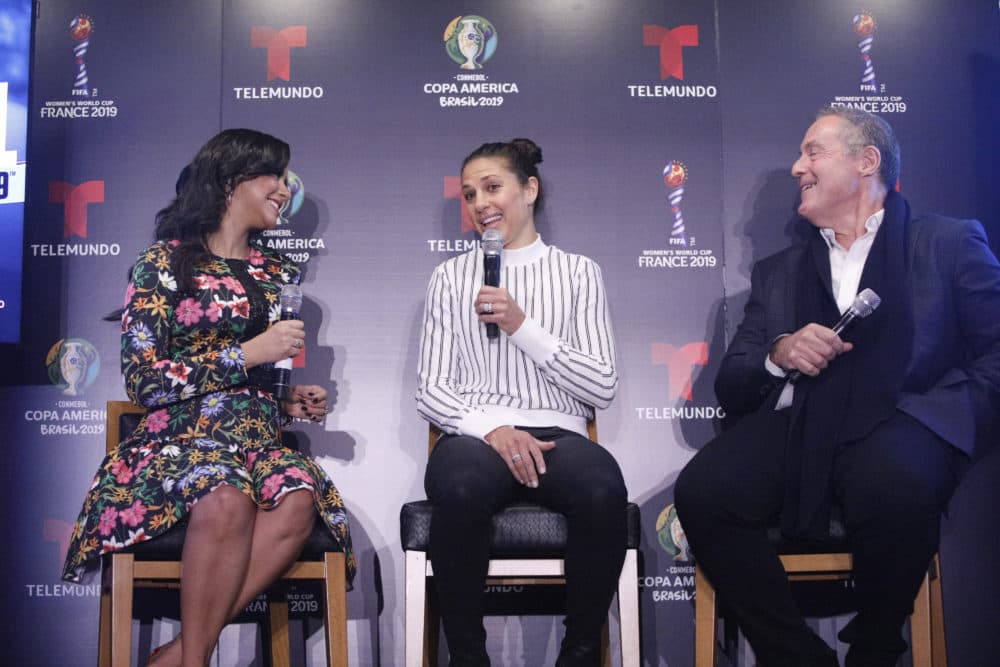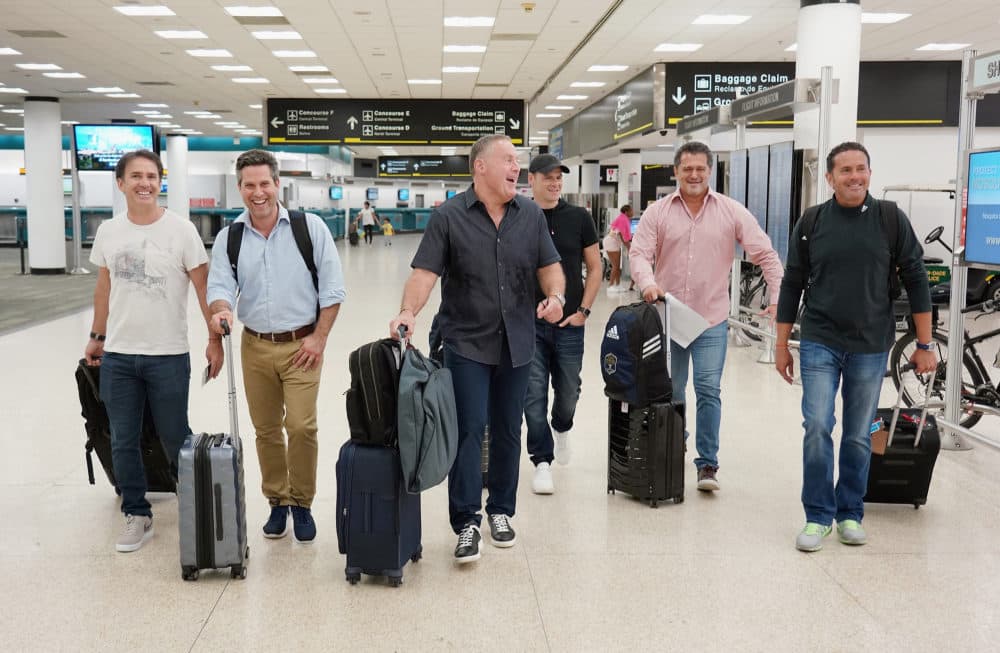Advertisement
'Gooooool!': Soccer Commentator Andrés Cantor Is More Than His Famous Call

Just 16 minutes into the 2015 Women’s World Cup final against Japan, American Carli Lloyd scored for the third time.
And the internet went crazy. Not just about Lloyd’s hat trick. But about the call, by Telemundo's Andres Cantor.
Andrés Cantor is the lead soccer play-by-play announcer for Telemundo Network. He joined us to talk about his life and career as a commentator.
KG: I know the first thing that everyone wants to talk about is how you call a goal, and we're going to get to that. But I actually want to start our conversation where your love of soccer began. Where did you grow up, and how important was soccer to you?
AC: I grew up in Argentina, in Buenos Aires. And pretty much in my days, soccer was the only sport every kid wanted to play. I think all of us played soccer — or football, like we called it. I played in the recess in my schools. I played on the weekends. I played in the streets. I played in clubs. I played everywhere I could.
KG: And you also grew up listening to soccer on the radio, right?
AC: Back then — in my growing days in the late '60s, early '70s — television wasn't the strongest medium. Radio was. You know, we listen either when we went to the stadium or in the car or at home to José María Muñoz. He was, like, the number one play-by-play announcer. He had a very, very good rhythm. He knew the game very well.
This was a phenomenon. I just said that all of my friends played soccer. Well, all of us listened to José María Muñoz. My ears still buzz from remembering him calling the games.
KG: Now, were you one of those kids who would practice calling games yourself?
AC: We all did. We all did, and when we played games, you know, in the park, we always had the replay of the play-by-play of the goal that I just had scored against my friends. Honestly, I never knew I was going to end up doing neither television nor radio. I knew from a very early age that I wanted to be a journalist. I went to USC and did not take one broadcast journalism class, because I liked writing.
KG: So in 1979, when you were a teenager, your family immigrated to the United States. What was that like for you?
AC: It was very, very tough, to be honest with you. First of all, because obviously I was a teenager. I had the love of soccer, I had all my friends, I had pretty much my teenage life. And, you know, I was taken away to a different culture, a different country. I thought I knew how to speak English because I had "A's" in my English classes. In my school in Argentina they taught British English. So when I got here with the few British words I knew — "trouser" instead of "pants," "pupil" instead of "student" — and people were talking to me. And I couldn't understand anything. I said, 'Oh my.'
"I had never been in a TV studio in my life. I get dressed. They said, 'We're going to put the game to tape. And the first game is going to air next Sunday.' "
Andrés Cantor
So it wasn't easy, to tell you the truth. Probably I think this resonates with many immigrants to this country, that at the beginning, you know, we have to fight and, you know, be tough. Because it's very, very hard to be away from your home country. But then at the end, if you stay, you grow up loving the place we call home now.
KG: So as you mentioned, you went to college at USC, but you did not study broadcasting. What was your plan?
AC: My plan was to be a written journalist. I wanted to be a print journalist. But, you know, fate and, I guess, destiny put me on the path of television first and radio second.
KG: Well, so let's talk about that. In February of 1987, you were 23 years old. You got an audition with the Spanish International Network, which would later become Univision. Tell me that story.
AC: They called me from SIN. They told me to bring two suits, two ties and two shirts for the audition. So I got there. I had never been in a TV studio in my life. I get dressed. They said, "We're going to put the game to tape. And the first game is going to air next Sunday and the following the next Sunday." And I said," "What, just like that?" "Yeah, yeah. We want to try you out." So that made me a little bit nervous because if the audition would have gone bad, OK, they throw the tape away, they erase it and that's the end of the story. But when they told me that they were going to air the audition, I thought to myself, "Oh, whoa."

The first game I did color commentary. We took a break for lunch. And then the person that ended up hiring me said, "We're looking for a play-by-play announcer really, not a color commentator. Do you think you can call the second game?" I said, "Sure, why not?" I was 23. I wasn't going to say no at that time. So I called that second game. I had the rhythm of the play-by-play in my ear by listening to games so much in my life, so it wasn't something totally new to me. So I gave it my best. Pretty much within the week after calling that first game, they gave me a full-time job.
KG: Wow. So you call that game. It's the first game you ever called. And it’s also the first time you made what is now your signature goal call. Did you surprise yourself?
AC: I'm gonna tell you a funny story. The guy that — the person that ended up being my boss — remember I said this was after lunch? You know ... he wasn't dozing off, but you know how it is after lunchtime? You get a little sleepy. And then the goal came, and, whoa! That woke him up for sure. But I did not think anything about it, really — because, you know, that's the way I heard goal calls all my life in Argentina.
KG: So you called every game of the 1990 World Cup, but it was really in 1994 when the tournament was held in the U.S. that you really broke through with an English-speaking audience. You were on Letterman.
The following year, you were in a Pepsi commercial.
Was there any part of you that worried that you were becoming known for just one thing?
AC: Yes. I found some old DVDs the other day. And I did find one story then by ABC News of the 1994 World Cup, which pretty much answers your question. Because I did get a lot of notoriety, obviously, by the goal call itself. But in this two-and-a-half minute piece for the evening news done by Armen Keteyian, I think, he came down to Miami. He talked about my style and my passion for the game and the way I called. And he did different clips, not just of the goal call.
I remember vividly it was very nice that somebody recognized ... it wasn't just, you know, the goal call. The goal call wasn't a gimmick. It was something that I feel and something that comes out naturally. And that beyond the goal call, there's a lot of preparation to have the audience engaged, entertained and passionate from the first whistle to the last.

KG: Absolutely. So, did you really almost faint while calling Landon Donovan's last-minute goal against Algeria at the 2010 World Cup?
AC: Yes. Yes, I did. I did. First of all, let me give the audience some context. The U.S. was being eliminated in the first round. It was 0-0, 92nd minute. It was freezing cold in Pretoria that night. That World Cup in South Africa was played in the winter. Usually World Cups are played in the summer. If the game would have been in the summer, I probably would have fainted. I think the cold kept me going.
I had given it my all. Radio play-by-play is totally different — or the way at least I call games on radio — is totally different than TV. I go at — you know, I drive 140 miles an hour on radio, and I respect the speed limit on TV at 65 because the picture tells the story. So I was all out. I was out of steam, out of gas, out of energy. And then the Landon Donovan counter attack happened.
Just kept on going and going and going. I had a hoarse voice. That was really, really the toughest call probably of my life because of what the goal meant, the minute it happened, how strongly I yelled it out. If you listen carefully at the end of the goal call, after I'm explaining that the goal was scored by the greatest player in the history of the U.S., there I started losing it. And I stumble. I say, "Uh, uh, uh." I was exhausted.
KG: You have recently finished calling your seventh Premier League season for Telemundo. I know none of us could have predicted that 2020 would be all that 2020 is, but what was it like calling soccer games during a pandemic?
AC: We have to really be careful and be sensitive to what we're saying when we call games now that soccer is back. It's not the same game that we used to see before the pandemic. The passion of the fans makes a whole lot of difference. I enjoyed — you know what I enjoy? I mean, out of the bad, I love listening to what is said on the pitch by the players and by the coaches. It's something that you never, never, never hear because of the roar of the crowd.
Andres Cantor is celebrating his 20th year with Telemundo.
This segment aired on August 8, 2020.





